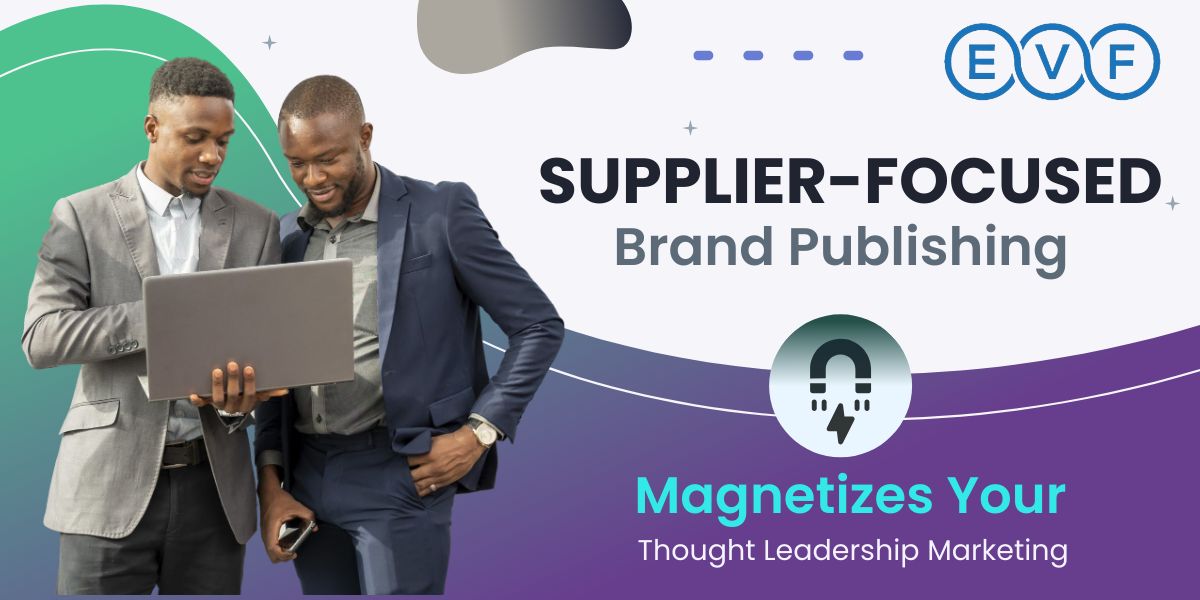
In the realm of supplier engagement, EVF Brand Studios offers a range of brand marketing models that address major growth challenges by fostering stronger connections, enhancing retention rates, and maximizing the lifetime value of supplier partnerships.
Acquiring Supplier Engagement At A Lower Cost

Supplier-Centric Content Creation:
Brand publishing allows companies to create content tailored to the interests, needs, and expectations of their suppliers.
Approach: This may include industry insights, market trends, and best practices relevant to their specific sector or niche.
Outcome: According PWC report, they discovered that by providing valuable information and resources, companies attract suppliers’ attention and demonstrate their commitment to mutual success.
Dedicated Supplier Portals:
Approach: Establishing dedicated supplier portals or online platforms enables companies to centralize communication, collaboration, and transactional activities with their suppliers.
Outcome: These portals serve as interactive hubs where suppliers can access product information, place orders, track shipments, and engage with company representatives in real-time, streamlining the procurement process and enhancing supplier satisfaction.
Supplier Outreach Initiatives:
Approach: Leveraging brand publishing channels such as email newsletters, webinars, and workshops enables companies to proactively engage with potential suppliers and build relationships based on trust, transparency, and mutual understanding.
Outcome: By showcasing their commitment to ethical sourcing, sustainability practices, and fair business partnerships, companies attract reputable suppliers aligned with their values and objectives.
Retaining Supplier Engagement and Confidence
Transparent Communication:
Approach: Brand publishing facilitates transparent communication and regular updates with suppliers regarding company policies, procedures, and performance expectations.
Outcome: According to Winman article, they state that by providing clear guidelines and expectations, companies mitigate misunderstandings and conflicts, fostering a harmonious and productive supplier relationship.
Value-Added Services:
Approach: Offering value-added services such as training programs, technical support, and supply chain optimization tools demonstrates companies’ commitment to enhancing suppliers’ capabilities and competitiveness.
Outcome: As per this Fast Capital article, they have detailed down the importance of building reliable supplier engagement. By empowering suppliers to succeed, companies strengthen the foundation of their partnership and reinforce loyalty over time.
Supplier Recognition Programs:
Recognizing and celebrating supplier achievements, milestones, and contributions through brand publishing initiatives reinforces a culture of appreciation and partnership. By showcasing exemplary suppliers and success stories, companies inspire healthy competition and motivate suppliers to strive for excellence, driving continuous improvement and innovation within the supply chain ecosystem.

Improving Suppliers’ Lifetime Value

Long-Term Partnership Development:
Beyond traditional investor communications, brand publishing enables companies to offer value-added services and resources to investors. This may include educational materials, market research reports, and investment tools that empower investors to make informed decisions and maximize their returns.
Performance Measurement and Feedback:
Implementing performance measurement metrics and feedback mechanisms enables companies to assess suppliers’ performance, identify areas for improvement, and recognize outstanding achievements.
By providing constructive feedback and actionable insights, companies empower suppliers to enhance their performance and deliver greater value over the long term, strengthening the foundation of their partnership and increasing lifetime value.
In summary, brand publishing serves as a powerful tool for addressing growth challenges in supplier engagement cycles including acquiring, retaining, and maximizing the lifetime value of supplier audiences. By prioritizing transparent communication, value-added services, and strategic partnership development, companies can build strong, sustainable supplier relationships that drive mutual success and innovation in today’s competitive marketplace.
Use Case Examples
Elevating Supplier Acquisition and Engagement: Brand Publishing Case Studies Across Industries

Explore how companies in the travel, hospitality, restaurant, retail, and fashion sectors are leveraging brand publishing approaches to enhance supplier acquisition and engagement, fostering mutually beneficial partnerships and driving business growth.
- Travel: Airbnb
- Airbnb’s supplier engagement portal provides resources and guides for hosts, including best practices, success stories, and community forums. Additionally, Airbnb publishes blog articles and case studies highlighting successful host experiences and innovative hospitality trends. By sharing valuable insights and fostering a supportive community, Airbnb attracts and retains hosts who are committed to providing exceptional guest experiences.
- Hospitality: Marriott International
- Marriott International’s supplier portal offers information on procurement processes, supplier diversity initiatives, and sustainability guidelines. Furthermore, Marriott publishes thought leadership articles and reports on industry trends, innovation in hospitality, and responsible sourcing practices. By promoting transparency and collaboration, Marriott strengthens its relationships with suppliers, driving supplier loyalty and engagement in the hospitality sector.
- Restaurant: Chipotle Mexican Grill
- Chipotle’s supplier engagement platform features updates on sourcing practices, quality standards, and sustainability initiatives. Additionally, Chipotle publishes articles and videos showcasing its partnerships with local farmers, food suppliers, and culinary artisans. By highlighting its commitment to responsibly sourced ingredients and supporting local suppliers, Chipotle attracts suppliers who share its values and commitment to ethical business practices.
- Retail: Nike
- Nike’s supplier engagement hub provides resources and tools for manufacturing partners, including compliance requirements, training materials, and sustainability guidelines. Moreover, Nike publishes reports and case studies on supply chain innovation, environmental stewardship, and social responsibility efforts. By promoting transparency and accountability throughout its supply chain, Nike builds trust and collaboration with suppliers, driving supplier satisfaction and loyalty in the retail sector.
- Fashion: H&M
- H&M’s supplier engagement platform offers information on ethical sourcing, supplier partnerships, and sustainability commitments. Additionally, H&M publishes articles and videos highlighting its collaborations with designers, textile suppliers, and manufacturing partners. By showcasing its dedication to responsible fashion practices and supporting supplier development, H&M attracts suppliers who share its vision for a more sustainable and ethical fashion industry.
Brand Marketing Updates
Get the latest brand development news and updates from all 22+ industry verticals and domain including education, manufacturing, professional services, construction, banking, insurance, healthcare and legal with expert analysis and stats.
Curios About Brand Marketing That Boosts Supplier Engagement?
If there something you can’t find through search results, contact us directly
